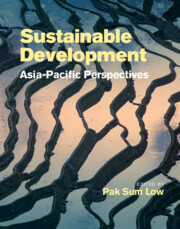Book contents
- Sustainable Development: Asia-Pacific Perspectives
- Sustainable Development: Asia-Pacific Perspectives
- Copyright page
- Dedication
- Contents
- Notes on contributors
- Peer reviewers
- Editor’s note
- Foreword
- Foreword
- Foreword
- Foreword
- Foreword
- Environmental keystones: Remembering Dr Mostafa Kamal Tolba
- Remembering Dr Mostafa Kamal Tolba
- Remembering Dr Mostafa Kamal Tolba
- Acronyms and abbreviations
- SI prefixes
- Unit abbreviations
- Chemical formulae
- Part I Sustainable Development: Theories and Practices
- 1 Asian identities
- 2 On sustainable development
- 3 Sustainability: A scientific dilemma
- 4 Respect and reward: Ecology from the Analects of Confucius
- 5 Sustainable development from an East-West integrative perspective: Eastern culture meets Western complexity theory
- 6 Sustainable urbanism: Measuring long-term architectural merit
- 7 Sustaining wooden architectural heritage
- 8 Green development in China
- 9 Bhutan’s sustainable development initiatives and Gross National Happiness
- 10 A different form of sustainable development in Thailand and Bhutan: Implementation of a sufficiency approach
- 11 The sustainability of food production in Papua New Guinea
- 12 Education for sustainable development: An overview of Asia-Pacific perspectives
- 13 A placemaking framework for the social sustainability of master-planned communities: A case study from Australia
- 14 Poverty, inequity, and environmental degradation: The key issues confronting the environment and sustainable development in Asia
- 15 The challenge of global climate change for international law: An overview
- 16 Sustainable development and climate change negotiations: Perspectives of developing countries
- Part II Sustainable Development: Challenges and Opportunities
- Index
- Endmatter
2 - On sustainable development
from Part I - Sustainable Development: Theories and Practices
Published online by Cambridge University Press: 23 December 2021
- Sustainable Development: Asia-Pacific Perspectives
- Sustainable Development: Asia-Pacific Perspectives
- Copyright page
- Dedication
- Contents
- Notes on contributors
- Peer reviewers
- Editor’s note
- Foreword
- Foreword
- Foreword
- Foreword
- Foreword
- Environmental keystones: Remembering Dr Mostafa Kamal Tolba
- Remembering Dr Mostafa Kamal Tolba
- Remembering Dr Mostafa Kamal Tolba
- Acronyms and abbreviations
- SI prefixes
- Unit abbreviations
- Chemical formulae
- Part I Sustainable Development: Theories and Practices
- 1 Asian identities
- 2 On sustainable development
- 3 Sustainability: A scientific dilemma
- 4 Respect and reward: Ecology from the Analects of Confucius
- 5 Sustainable development from an East-West integrative perspective: Eastern culture meets Western complexity theory
- 6 Sustainable urbanism: Measuring long-term architectural merit
- 7 Sustaining wooden architectural heritage
- 8 Green development in China
- 9 Bhutan’s sustainable development initiatives and Gross National Happiness
- 10 A different form of sustainable development in Thailand and Bhutan: Implementation of a sufficiency approach
- 11 The sustainability of food production in Papua New Guinea
- 12 Education for sustainable development: An overview of Asia-Pacific perspectives
- 13 A placemaking framework for the social sustainability of master-planned communities: A case study from Australia
- 14 Poverty, inequity, and environmental degradation: The key issues confronting the environment and sustainable development in Asia
- 15 The challenge of global climate change for international law: An overview
- 16 Sustainable development and climate change negotiations: Perspectives of developing countries
- Part II Sustainable Development: Challenges and Opportunities
- Index
- Endmatter
Summary
First the evolving perceptions.
The concept of sustainable development did not come up overnight. It is based on tenets expressed almost one and a half centuries ago. In his 1864 classic Man and Nature, George Perkins Marsh tells us, ‘Man can control the environment for good as well as ill’; ‘Wisdom lies in seeking to preserve the balance of nature’; and ‘The present generation has an obligation, above all, to secure the welfare of future generations.’ At the turn of the last century, Mohandas K. Gandhi, asked if he would like a free India to become like Great Britain, replied, ‘Certainly not. If it took Britain half the resources of the globe to be what it is today, how many globes would India need?’ More recently, Rachel Carson in 1962 with her book Silent Spring, which made the general American public aware of the dangers of pesticides, launched the modern popular environment movement.
Keywords
- Type
- Chapter
- Information
- Sustainable Development: Asia-Pacific Perspectives , pp. 8 - 12Publisher: Cambridge University PressPrint publication year: 2022

